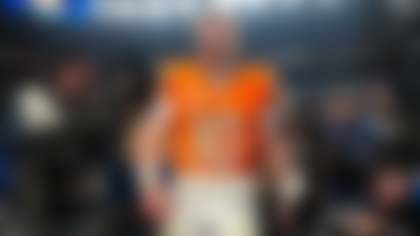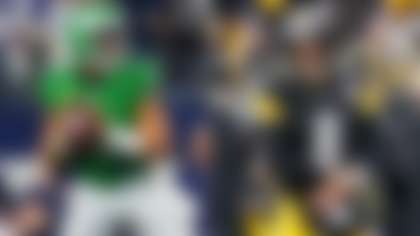Ten NFL teams are conducting mandatory minicamps this week, which means there's more to learn about how some squads have evolved this offseason. There's plenty of news about the development of younger players, the impact of new coaches and the return of veterans from injuries. There's just as much to discuss about happenings off the field, as players mired in contract talks hold court or don't show for practice at all. It's all useful stuff in the end.
Since we're entering the final days before summer vacations ensue, this is a good time for The First Read to talk about what's happening at minicamps around the league. These are some of the biggest questions remaining for teams that are wrapping up offseason workouts.
1) Can the 49ers make Brandon Aiyuk happy?
49ers GM John Lynch already had a tough challenge in trying to work out a contract extension with Aiyuk, who is entering the final year of his rookie deal and isn’t participating in minicamp. Recent events in the wide receiver market have made that task even tougher. As much as Justin Jefferson's new deal (four years, $140 million) impacts this situation, it's likely an assortment of other deals that cloud this negotiation. Aiyuk isn't at the same level as Jefferson but his production over the past three seasons -- 209 receptions, 3,183 yards and 20 touchdowns -- compares favorably with players who just signed massive new contracts of their own. Detroit's Amon-Ra St. Brown (315-3,588-21) received a deal that averages $30 million a year, while Miami's Jaylen Waddle (251-3,385-18) now has an extension that averages more than $28 million per year. It's hard to argue Aiyuk doesn't deserve to be in that neighborhood.
What makes it difficult on Lynch is San Francisco already has a roster loaded with expensive players (seven players, including Aiyuk, have cap hits of at least $12 million) and quarterback Brock Purdy is eligible for an extension after this season. There's already been plenty of speculation about what happens to fellow wide receiver Deebo Samuel down the road if a deal with Aiyuk gets done. Lynch also is operating like one of the two will be leaving eventually, using a first-round pick on wide receiver Ricky Pearsall in April and signing veteran Jauan Jennings to a new deal. This process isn't going to get any easier, but the one thing that is certain: Aiyuk is getting paid one way or another.
2) Have the Eagles fixed their defense?
If you listen to Eagles defensive end Brandon Graham, it appears they are moving in the right direction in Philly. Graham made some pointed comments about the factors involved in the Eagles' defensive problems in 2023, most notably saying the team "didn’t have all the right coaches in the right position." The main issue that evolved from that dynamic, according to Graham, was a recurring trend of faulty communication that lingered throughout the season and plagued Philadelphia in its playoff loss to Tampa Bay.
The Eagles hired veteran defensive coordinator Vic Fangio to correct a lot of those woes. It's just as interesting that Graham praised the work of new defensive line coach Clint Hurtt, who will be tasked with maximizing the potential of former first-round picks like Jordan Davis and Jalen Carter. But don't get it twisted. The demise of this unit didn't fall entirely on Sean Desai and Matt Patricia, the two men who coordinated that group last year. The Eagles needed more talent on the back end, and they've found that in the return of veteran safety C.J. Gardner-Johnson and the drafting of cornerback Quinyon Mitchell and defensive back Cooper DeJean. It already sounds like there is more excitement about those additions, along with more faith in Fangio's proven schemes.
3) Can the Cowboys resolve their financial challenges?
It's always compelling to talk money at this time of year, but here's the first thing to remember about the situation with the Cowboys: Every player who is looking for a new deal is under contract. As interesting as it is to think about Dak Prescott's next contract, he'll be playing this season. The same is true for wide receiver CeeDee Lamb, who is skipping minicamp in the hopes of leveraging an extension, and linebacker Micah Parsons. That's why some of this stuff tends to be overblown. Lamb deserves to be paid on a scale comparable to Justin Jefferson, who just received a four-year, $140 million deal, and he's likely to get there. Parsons is one of the most disruptive forces in the game, and that tends to lead to considerable riches as well.
Yes, the Cowboys will have some other tough roster decisions to make once these players get paid, but that's life in the NFL. Think about it this way: When was the last time Dallas owner Jerry Jones didn't pay a player who ranked among the best in the league in his prime? Prescott really is the wild card here. He's proven to be a good enough player to win division titles and make Pro Bowl appearances. The problem is this team has yet to move deep into the playoffs with him under center. Is that likely to change with him eating up more salary cap space and other key players being forced to move on? It's hard to see that happening. But the team and Prescott have been down this road before, and it's probably going to take a lot of time to find a resolution.
4) How fast can Caleb Williams acclimate to the NFL?
If there's one underrated aspect of how Williams will grow in his rookie season, it's the opportunities he's receiving every day in practice against the Bears defense. The players on that side of the football seem to be taking it upon themselves to show Williams what he's going to face on a weekly basis in this league. The fact that there's ample talent in that unit -- including middle linebacker Tremaine Edmunds, cornerback Jaylon Johnson and safety Kevin Byard -- means Williams is going to benefit in the long run. This is a defense that has the goods to be elite. It should be making life tougher on Williams in minicamp, where he's reportedly been confused at times by some coverages he's been seeing. This is the next obvious step in a process that has been nearly three years in the making. The Bears have given Williams, the first overall pick in this year's draft, a strong supporting cast on offense. Now he must learn what he can and can't get away with in his rookie season. The growing pains will come, but the Bears have the right idea of how to make those issues as manageable as possible.
5) What is Tua Tagovailoa really worth?
The Dolphins quarterback answered plenty of questions about his negotiations for a contract extension on the first day of Miami's minicamp. The big takeaway is that he wants this process completed sooner than later, as Tagovailoa admitted to reporters that he's “antsy” about the dealings. It makes sense. He's watched two other quarterbacks in his draft class score huge extensions earlier in their careers (Cincinnati's Joe Burrow and the Los Angeles Chargers' Justin Herbert). He's also just watched the Detroit Lions give Jared Goff a four-year, $212 million extension to continue leading that team. You better believe that Tagovailoa's representatives are thinking he belongs in the annual average salary range of at least $50 million, given Goff's deal. The question is whether he's actually worth that. Of the five quarterbacks who average that much money on a per year basis, three have played in Super Bowls (Burrow, Goff and Philadelphia's Jalen Hurts) while a fourth has two Most Valuable Player awards (Baltimore's Lamar Jackson). Herbert is the least accomplished player in that group, but he's also started 62 games in his career. Tagovailoa hadn't played a full season until last season.
As important as all this is to discuss, the Dolphins reportedly are committed to Tagovailoa as their franchise quarterback. He'll play this year on the fifth-year option, but this doesn't feel like a process that will turn into what happened in Baltimore with Jackson (who ultimately was allowed to test the market while carrying the franchise tag before ultimately signing a new deal with the Ravens). The Dolphins wouldn't be the first team to live with overpaying a quarterback who can't carry a franchise. It's just a matter of learning how to work around that.
6) What impact will Stefon Diggs have on C.J. Stroud?
The reports out of Houston already indicate Diggs is doing all the right things as he acclimates to the Texans. His energy and his attitude have been positive, and there are no hints of the drama that festered around him toward the end of his run in Buffalo. The reality is Diggs wants to win. The 30-year-old also can still play at a high level. The difference between his arrival in Houston -- via a trade earlier this offseason -- and his time in Buffalo is that Stroud is much farther along in his development than Bills quarterback Josh Allen was when Diggs showed up. There's also more accomplished talent on the Texans roster, as wide receiver Nico Collins broke out last season and Tank Dell proved to be an impressive young player as well, before his season-ending injury. So, the Texans don't need Diggs to dominate the stat sheet every week. They need him to be a reliable leader, a clutch target in critical situations and a player who can control his emotions when things aren't going well (which became a problem for him the last couple years in Buffalo). It helps that Diggs already was establishing a relationship with Stroud before this trade happened. They struck up a friendship with each other at the Pro Bowl and that bond strengthened as soon as Diggs arrived in Houston. The synchronicity of this hasn't been lost on Diggs at all. He's landed in another spot with a young, talented quarterback he already was getting to know. The nice part is he doesn't have to do nearly as much to make this deal a success.
7) What will Anthony Richardson be in Year 2?
The biggest question hovering around Richardson is going to be his health. He missed one game with a concussion last year before a Week 5 shoulder injury resulted in season-ending surgery. Offseason reports indicated that Richardson was progressing nicely, but he also showed enough discomfort in that same throwing shoulder that he was limited during the second day of minicamp and sat out portions of Thursday's workout after experiencing soreness. It's quite possible the team is simply being cautious with its second-year quarterback. It's also true that no organization wants to see its franchise signal-caller hanging around the medical staff so soon after an injury-marred rookie campaign. The Colts obviously saw some nice flashes from Richardson in his limited time last season, but the reality is he was considered a bit raw coming into the league. This isn't C.J. Stroud we're talking about. Richardson needs to start getting those valuable reps that will speed up his development.
The good news is that there's more help around him. GM Chris Ballard made a point of adding more speed to the receiver position and rookies Adonai Mitchell and Anthony Gould have showcased their explosiveness this offseason. You can see the potential in the Colts offense. It's just a matter of keeping Richardson on the field.
8) Is this the year when Jameson Williams figures it out?
There have been so many great vibes around the Detroit Lions the last couple years that it's been easy to forget something that hasn't worked so well: The development of Williams. GM Brad Holmes traded up in the 2022 draft to take the former Alabama wide receiver with the 12th overall pick. What the team has received so far has been underwhelming (25 catches, 395 receiving yards and four total TDs in 18 games over two seasons), which is why this offseason is so critical for Williams. He couldn't participate in offseason workouts as a rookie because he was recovering from surgery for a torn ACL. He also missed the first four games of last year while serving a suspension for violating the league's gambling policy.
Thus far, the Lions have been encouraged by the way Williams is pushing himself through offseason workouts, even though he's still struggling occasionally with drops. The fact is that Williams could supercharge an offense that already ranks among the league's best. His electric speed could create even more space for Amon-Ra St. Brown and second-year tight end Sam LaPorta, while also lightening up boxes for running backs Jahmyr Gibbs and David Montgomery. There have been a lot of reasons to explain why Williams hasn't taken off yet. This is the year when we'll learn if he really can live up to those lofty expectations.












